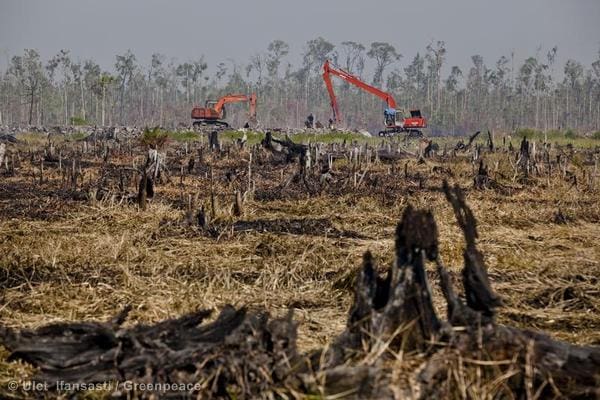Indonesian peatland communities call for recognition of their rights and traditional knowledge in managing peatlands
“We, the representatives of peatland communities in Indonesia are making a public appeal to international peatland communities, the Government of Indonesia, financial institutions, and international environmental and climate organizations…”
Thus began a recent public call for action from peatland communities in Sumatra, Kalimantan and Papua, gathered in Palangka Raya, Central Kalimantan on February 24 – 25. The communities had assembled to make their long-neglected voice heard and their undeniable role in sustainable community-based management of Indonesia’s peatland areas recognized.
More than 10 million people live and depend directly on Indonesian peatlands for their survival. Peatlands are useful for water catchment and home to many threatened species. But in recent years, a wave of peatland conversion for industrial use has caused significant ecological, economic, social and cultural impacts on the local residents who have managed these lands for generations.
Peatland conversion: A major contributor to global warming
In Indonesia, peatlands account for more than 32.5 mio hectares, over 10 percent of the archipelago’s land. But a large portion of peatlands have suffered severe degradation after conversion into large-scale industrial palm oil, forest plantations, mining and other big development projects.
The clearing of peatlands, composed of thick water-logged organic soil with layers of dead and decaying plant material, is usually done by digging canals to drain the peat, and then burning it. This generates heavy fires and toxic smoke which, apart from causing tensions with neighboring countries such as Singapore and Malaysia, releases two billion tonnes of carbon to the atmosphere every year according to Wetlands International. That’s equal to eight percent of global carbon emission caused by human activities, making Indonesia the third biggest carbon emitter of the world after China and the USA.
Globally peatlands store at least 550 Gigatonnes of carbon in their organic soils. This is twice the amount of carbon stored in the world’s forests. Because peatland forest fire doesn’t just spread through the vegetation on the surface but also through the underlying layer of peat itself, it’s extremely difficult to control. After burning, peat clearing further requires spreading of chemicals to improve soil fertility.
A misguided push for large-scale industrial plantations

To support economic growth, the Indonesian government opened peatlands to companies and investors, issuing a controversial regulation: the Agriculture Ministry decree No. 14/2009 on Peatland Utilisation for Palm Oil Cultivation.
But peat soil generally contains high acidity (high pH), with low nutrients and alkalinity making it less attractive in terms of productivity. Another generally overlooked issue is the lowering of the soil surface as the result of compaction and loss of substance, an inevitable phenomenon where peatlands have been drained. If no other argument is deemed convincing, this one directly affects business; yet, both the government and the corporate sector are yet to acknowledge the failure of palm oil plantations on peatlands.
Community management preserves peatlands
On the other side of the adverse results of the industrial conversion of peatlands are shining examples of sustainable management of the same lands by local communities. Peatland management undertaken by the community based on their local knowledge indicates that communities are able to manage their land in a sustainable manner. Local communities have developed suitable agroforestry, agriculture, farming and fishery activities, alternating rice and vegetables cultivation during dry season, with fish nursing during wet seasons. They also rear livestock such as buffalos and cows, besides harvesting perennials like rubber and coconut.
Despite ongoing community use, peatlands are viewed as not economically productive, and only contributing to economic development if they are used for industrial oil palm plantations . By viewing these lands as empty or non-productive ,their conversion results in peat communities losing their land and being deprived of their right to a safe and healthy environment and a decent livelihood. This is what prompted Indonesian peatland communities to issue a joint declaration in Palangka Raya end of February calling for a complete stop in peatland conversion.
The communities demanded that donors, investors, and corporate sector enforce high social and environmental standards for any development project on peatland. They also urged the government to address peatland degradation, illegal exploitation and conflicts resolution. Finally, peatland communities call for recognition of their rights and their traditional knowledge in managing peatlands.
“For investors, peatland is just another land to exploit, and for the government a source for revenue generation,” said Sudarto Marelo, a representative of Sriwijaya Peat Farmers Union from Sumatra. “But another message has just been conveyed in Palangka Raya: peatland is the land of life.
For more details, contact:
Mr. Andiko, Senior Lawyer, ASM Law Office, Indonesia
[email protected]
